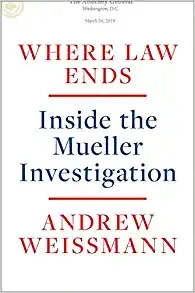Reading Level
What is the reading level of Where Law Ends: Inside the Mueller Investigation?
Analysing the books in the series, we estimate that the reading level of Where Law Ends: Inside the Mueller Investigation is 10th and 11th grade.
Expert Readability Tests for
Where Law Ends: Inside the Mueller Investigation
| Readability Test | Reading Level |
|---|---|
| Flesch Kincaid Scale | Grade 11 |
| SMOG Index | Grade 13 |
| Coleman Liau Index | Grade 11 |
| Dale Chall Readability Score | Grade 6 |
Reading Time
8 hrs 46 mins
How long to read Where Law Ends: Inside the Mueller Investigation?
The estimated word count of Where Law Ends: Inside the Mueller Investigation is 131,440 words.
A person reading at the average speed of 250 words/min, will finish the book in 8 hrs 46 mins. At a slower speed of 150 words/min, they will finish it in 14 hrs 37 mins. At a faster speed of 450 words/min, they will finish it in 4 hrs 53 mins.
| Where Law Ends: Inside the Mueller Investigation - 131,440 words | ||
|---|---|---|
| Reading Speed | Time to Read | |
| Slow | 150 words/min | 14 hrs 37 mins |
| Average | 250 words/min | 8 hrs 46 mins |
| Fast | 450 words/min | 4 hrs 53 mins |
- Authors
-
Andrew Weissmann
More about Where Law Ends: Inside the Mueller Investigation
131,440 words
Word Count
for Where Law Ends: Inside the Mueller Investigation
432 pages
Pages
14 hours and 8 minutes
Audiobook length
Description
In the first and only inside account of the Mueller investigation, one of the special counsel’s most trusted prosecutors breaks his silence on the team’s history-making search for the truth, their painstaking deliberations and costly mistakes, and Trump’s unprecedented efforts to stifle their report.“Weissmann delivers the kind of forceful, ringing indictment that Mueller’s report did not.”—The New York TimesIn May 2017, Robert Mueller was tapped to lead an inquiry into Russian interference in the 2016 presidential election, coordination by foreign agents with Donald Trump’s campaign, and obstruction of justice by the president. Mueller assembled a “dream team” of top prosecutors, and for the next twenty-two months, the investigation was a black box and the subject of endless anticipation and speculation—until April 2019, when the special counsel’s report was released.In Where Law Ends, legendary prosecutor Andrew Weissmann—a key player in the Special Counsel’s Office—finally pulls back the curtain to reveal exactly what went on inside the investigation, including the heated debates, painful deliberations, and mistakes of the team—not to mention the external efforts by the president and Attorney General William Barr to manipulate the investigation to their political ends. Weissmann puts the reader in the room as Mueller’s team made their most consequential decisions, such as whether to subpoena the president, whether to conduct a full financial investigation of Trump, and whether to explicitly recommend obstruction charges against him. Weissmann also details for the first time the debilitating effects that President Trump himself had on the investigation, through his dangling of pardons and his constant threats to shut down the inquiry and fire Mueller, which left the team racing against the clock and essentially fighting with one hand tied behind their backs. In Where Law Ends, Weissmann conjures the camaraderie and esprit de corps of the investigative units led by the enigmatic Mueller, a distinguished public servant who is revealed here, in a way we have never seen him before, as a manager, a colleague, and a very human presence. Weissmann is as candid about the team’s mistakes as he is about its successes, and is committed to accurately documenting the historic investigation for future generations to assess and learn from. Ultimately, Where Law Ends is a story about a team of public servants, dedicated to the rule of law, tasked with investigating a president who did everything he could to stand in their way.
